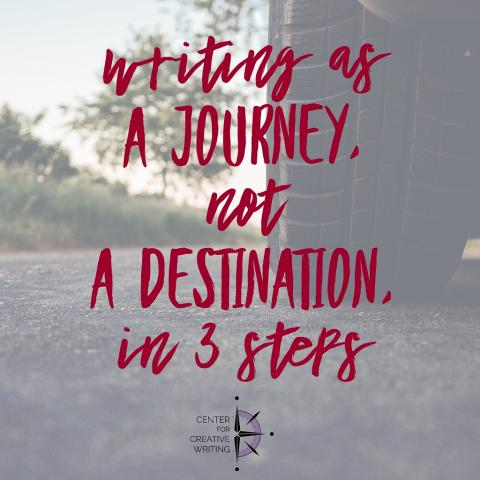Writing as a Journey, Not a Destination
The last few days have been cool where I live. Usually, temperatures in the Midwest run above 90 degrees this time of year, but they have been lingering below 80 for three days of ease that no one in this town will begrudge because, being a college town, it is prime time for move-ins and move-outs. For those of us who live here full-time, it is also the best time of year for a long drive out of the city.

Indiana is mostly flat, but the roads south of Bloomington wind up and down small hills. Cruising these roads reminds me of floating in the ocean, being rocked by the rhythmic swell of waves. That floating, rocking feeling? It is exactly what I’m seeking when I write. I want to ease my mind into motion. I want to be carried. I want to feel free.
When I write to tell a specific story, I have periods where I cannot locate that ease. Writing can feel like slamming into a wall. I grow frustrated and withdraw from the process. I become hesitant to re-engage. I begin to think of my writing as “blocked” when, if I were on the road and found it blocked, I would turn around and pursue a new direction. And why not? My goal is to be away from the busyness of downtown as the students arrive. I would not consider myself stuck.
What I need to remember is that encountering a roadblock is part of the journey—and this, of course, applies to writing as much as it does to our physical location. If you are frustrated by dead ends in your writing, you may be too destination-focused.
So how to focus on the journey instead of the point of arrival? And how to apply that understanding to your writing practice? Consider these three routes back to writing success:
Start over
Go back to the beginning. That’s right; make a U-turn and start again. You may find the path extended, or simply discover you took a wrong turn. The point is, even when you don’t know where you are at the moment, you probably know where you started. Backtrack, and start over.
Take a different road
If backtracking doesn’t reveal your desired exit, don’t keep driving back and forth over the same ground. In writing terms, there is something about your story that isn’t working and requires a new direction. Cruise elsewhere and make note of what you find.
Make your own path
Go your own way. Take it off-road. In other words, release yourself from the boundaries of the The Way. Where you are going, you don’t need roads. In your writing, you get to create the structure.
While a barrier may be a surprise, it doesn’t need to stop you in your tracks. Keep your mind open to possibilities by veering from your plotted course. You never know what you will discover.
A writing exercise
Try one of the three steps above to revive a piece of writing that made you feel stuck. Dig out a draft that could use some attention and try going back to the beginning, or taking it in an entirely different direction. It might not be the story you set out to write, but not all who wander are lost! The story you end up writing could stand on its own or offer some insight into your plot or process that helps you navigate the block in another way.
Originally published on the Center for Creative Writing blog.
Good, sound advice @shawnamawna! I don't think I've ever thought about that approach to writing (not that I write stories or anything; but have wanted to). If and when I get the chance to really sit down and try, I will have to remember that. Thanks for sharing!
Congratulations @shawnamawna! You have completed the following achievement on the Hive blockchain and have been rewarded with new badge(s) :
Your next target is to reach 80000 upvotes.
You can view your badges on your board and compare yourself to others in the Ranking
If you no longer want to receive notifications, reply to this comment with the word
STOP